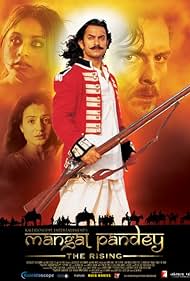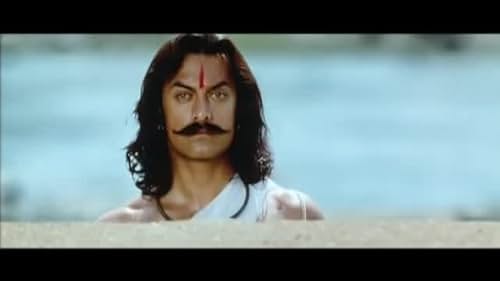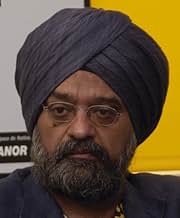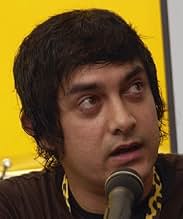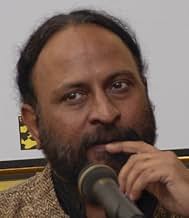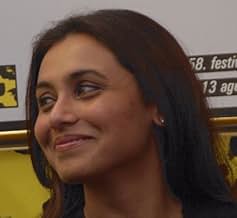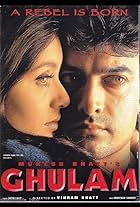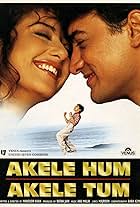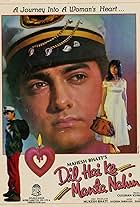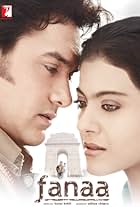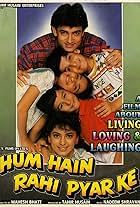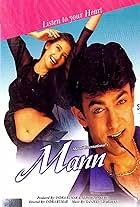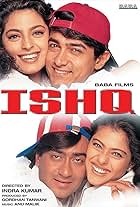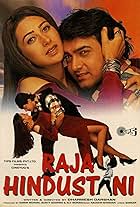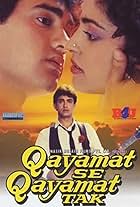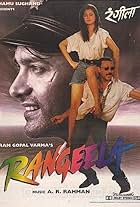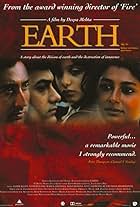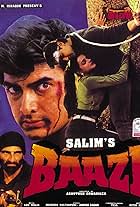Mangal Pandey: The Rising
- 2005
- 2h 30min
CALIFICACIÓN DE IMDb
6.5/10
11 k
TU CALIFICACIÓN
Agrega una trama en tu idiomaThis is a film about the leader of the 1857 mutiny and his fight against the British rule.This is a film about the leader of the 1857 mutiny and his fight against the British rule.This is a film about the leader of the 1857 mutiny and his fight against the British rule.
- Premios
- 1 premio ganado y 7 nominaciones en total
Habib Tanvir
- Bahadur Shah Zafar
- (as Tanveer Habib)
Varsha Usgaonkar
- Rani Laxmibai
- (as Rani Lakshmibai)
Dibyendu Bhattacharya
- Krupashankar Singh
- (as Dibiyendu Bhattacharya)
- Dirección
- Guionistas
- Todo el elenco y el equipo
- Producción, taquilla y más en IMDbPro
Argumento
¿Sabías que…?
- TriviaHugh Jackman turned down the role of Captain William Gordon.
- ErroresWhen the opening credits roll, a coin can be seen on which there are the following words "Victoria Empress". The events of the film are set in 1857, but Queen Victoria becomes Empress of India by the decision of the British Parliament only in 1876 and this is announced in India in 1877, 20 after the story of the film. It is important, because the Mughal Emperor (Bahadur Shah II), still alive in 1857, is also shown in the film, and the British Queen gets this title long after his deposition in 1857 and his 1862.
- Citas
Mangal Pandey: What is "company"?
Captain William Gordon: In your Ramayana there was one villain "Ravana" who had ten heads, company has a hundred heads and they're all joined by the glue of greed.
- ConexionesFeatured in The Story of India: Freedom (2007)
Opinión destacada
I am amazed at the negative comments about this film, especially from India. I'll address those criticisms later after providing a summary of the film.
Set in 1857, the film tells the story of Mangal Pandey, a sepoy (private) in the 34th Native Infantry regiment of the Bengal Army (the army of the Presidency of Bengal, governed by the British East India Company and recruited largely from upper caste UP and Bihar stock). Mangal is depicted as an ordinary soldier who is offended by the introduction of the new Enfield rifle cartridges which were greased with pig and cow fat (the former anathema to Muslims and the latter sacred to Hindus). The movie shows him changing from a loyal Company sepoy who saved a British officer's life, to one who ends up questioning the logic of British rule. Other themes include his friendship with the same British officer, the officer's rescue and subsequent romantic relationship with a sati - a widow expected to burn herself on her husband's funeral pyre,and a prostitute who exclusively services the English brothels but falls for Pandey. The movie brings opium cultivation, corruption within the Company, the growing distance between English and Indians, as well as backward, traditional Indian attitudes into sharp focus.
All in all, the film is highly entertaining, a good story - well told, with powerful performances by the main characters. Aamir Khan is in his element, living the character of Pandey and conveying a fantastic portrayal of the soldier who realizes, bit by bit, that his loyalty to a foreign army makes him as "untouchable" as the low-caste man or prostitutes he scorns. Toby Stephens performance as the outsider in British India (Scottish, poor schooling, too fraternal with the natives) was brilliant and his chemistry with Khan was the high mark of the film's dramatic impact. The music by AR Rahman is louder than usual and some of the beats are frankly out of sync with the times ( the lesbianish gypsy dance number was a bit much!!).
The strength of the film was in conveying a sense of the time period - costumes,hair-styles, sets, manners ( the English officer's "Koi Hai"), were exactly what one could expect. The historical background was fairly accurate (sati was outlawed, opium cultivation was forced, the Company was beset by corruption, the English did have European only brothels) though the exact interpretation of events may have not been supported by history.
Which brings me to the criticism of the film. these seem to be of two variants - one, the film was not entertaining enough, and two, the anguished howl of the historians who decry its historical illegitimacy in the hope that no one may turn nationalist by seeing this film.
I will dismiss the first criticism, since that may be a matter of taste - certainly, desi (Indian) audiences raised on simpler story lines and poorer production values (see Asoka and n number of Indian period dramas) may find The Rising a bit heavy to digest.
Historically, the film may be inaccurate in the sense that Mangal Pandey may not have been the nationalist as portrayed, the relationships with the English officer and the prostitute are probably fictitious. But are they impossible? NO. The film has a paragraph disclaimer about inaccuracy at the beginning but this does not satisfy the history lobby. Why is it not possible that the official version about Pandey - that he was under the influence of bhang ( a hallucinogen) when he shot and killed an officer and then tried to shoot himself - is dressed up to cover the Company's stupidity in introducing the greased cartridges? Its not as if such "doctoring" of history has not taken place - witness the designations of "Mutiny" on the British side and "First War of Indian Independence" on the Indian side - when it was something in between? Secondly, why is The Rising being targeted when virtually every Indian film plays merry with historical events and characters? Akbar and Salim did not go to war over a dancing girl (Mughal-e-Azam), Shah Jahan was not the devoted son depictd in Taj Mahal but an ambitious usurper, one hopes that Ashoka was not the ghastly caricature depicted in Shahrukh Khan's film, and certainly India was not administered by ARMY officers as shown in Lagaan b ut by a civil ICS administration.
Similarly, Hollywood glosses over the fact that getting the German Enigma machines in WW2 was a purely British affair (U-571 shows us otherwise), and of course America won the war (no mention of UK/Common wealth forces, or more importantly - Soviet forces).
What I am saying is that films always distort history a bit - and so long as they are not conveying a completely different story - that should not matter. A purist on the matter of history myself, I am surprised by the vehemence of the historical community's attack on the film. My guess is that they do not want a false sense of nationalism to emerge on the basis of the Mangal Pandey story. They are a hundred and fifty years late in stopping the myth from taking hold.
In the end The Rising is a great film, a great story, well shot, with a few excusable omissions.
Set in 1857, the film tells the story of Mangal Pandey, a sepoy (private) in the 34th Native Infantry regiment of the Bengal Army (the army of the Presidency of Bengal, governed by the British East India Company and recruited largely from upper caste UP and Bihar stock). Mangal is depicted as an ordinary soldier who is offended by the introduction of the new Enfield rifle cartridges which were greased with pig and cow fat (the former anathema to Muslims and the latter sacred to Hindus). The movie shows him changing from a loyal Company sepoy who saved a British officer's life, to one who ends up questioning the logic of British rule. Other themes include his friendship with the same British officer, the officer's rescue and subsequent romantic relationship with a sati - a widow expected to burn herself on her husband's funeral pyre,and a prostitute who exclusively services the English brothels but falls for Pandey. The movie brings opium cultivation, corruption within the Company, the growing distance between English and Indians, as well as backward, traditional Indian attitudes into sharp focus.
All in all, the film is highly entertaining, a good story - well told, with powerful performances by the main characters. Aamir Khan is in his element, living the character of Pandey and conveying a fantastic portrayal of the soldier who realizes, bit by bit, that his loyalty to a foreign army makes him as "untouchable" as the low-caste man or prostitutes he scorns. Toby Stephens performance as the outsider in British India (Scottish, poor schooling, too fraternal with the natives) was brilliant and his chemistry with Khan was the high mark of the film's dramatic impact. The music by AR Rahman is louder than usual and some of the beats are frankly out of sync with the times ( the lesbianish gypsy dance number was a bit much!!).
The strength of the film was in conveying a sense of the time period - costumes,hair-styles, sets, manners ( the English officer's "Koi Hai"), were exactly what one could expect. The historical background was fairly accurate (sati was outlawed, opium cultivation was forced, the Company was beset by corruption, the English did have European only brothels) though the exact interpretation of events may have not been supported by history.
Which brings me to the criticism of the film. these seem to be of two variants - one, the film was not entertaining enough, and two, the anguished howl of the historians who decry its historical illegitimacy in the hope that no one may turn nationalist by seeing this film.
I will dismiss the first criticism, since that may be a matter of taste - certainly, desi (Indian) audiences raised on simpler story lines and poorer production values (see Asoka and n number of Indian period dramas) may find The Rising a bit heavy to digest.
Historically, the film may be inaccurate in the sense that Mangal Pandey may not have been the nationalist as portrayed, the relationships with the English officer and the prostitute are probably fictitious. But are they impossible? NO. The film has a paragraph disclaimer about inaccuracy at the beginning but this does not satisfy the history lobby. Why is it not possible that the official version about Pandey - that he was under the influence of bhang ( a hallucinogen) when he shot and killed an officer and then tried to shoot himself - is dressed up to cover the Company's stupidity in introducing the greased cartridges? Its not as if such "doctoring" of history has not taken place - witness the designations of "Mutiny" on the British side and "First War of Indian Independence" on the Indian side - when it was something in between? Secondly, why is The Rising being targeted when virtually every Indian film plays merry with historical events and characters? Akbar and Salim did not go to war over a dancing girl (Mughal-e-Azam), Shah Jahan was not the devoted son depictd in Taj Mahal but an ambitious usurper, one hopes that Ashoka was not the ghastly caricature depicted in Shahrukh Khan's film, and certainly India was not administered by ARMY officers as shown in Lagaan b ut by a civil ICS administration.
Similarly, Hollywood glosses over the fact that getting the German Enigma machines in WW2 was a purely British affair (U-571 shows us otherwise), and of course America won the war (no mention of UK/Common wealth forces, or more importantly - Soviet forces).
What I am saying is that films always distort history a bit - and so long as they are not conveying a completely different story - that should not matter. A purist on the matter of history myself, I am surprised by the vehemence of the historical community's attack on the film. My guess is that they do not want a false sense of nationalism to emerge on the basis of the Mangal Pandey story. They are a hundred and fifty years late in stopping the myth from taking hold.
In the end The Rising is a great film, a great story, well shot, with a few excusable omissions.
- darashukoh
- 11 sep 2005
- Enlace permanente
Selecciones populares
Inicia sesión para calificar y agrega a la lista de videos para obtener recomendaciones personalizadas
- How long is Mangal Pandey?Con tecnología de Alexa
Detalles
Taquilla
- Presupuesto
- INR 340,000,000 (estimado)
- Total en EE. UU. y Canadá
- USD 954,108
- Fin de semana de estreno en EE. UU. y Canadá
- USD 531,018
- 14 ago 2005
- Total a nivel mundial
- USD 8,142,076
- Tiempo de ejecución2 horas 30 minutos
- Color
- Mezcla de sonido
- Relación de aspecto
- 2.35 : 1
Contribuir a esta página
Sugiere una edición o agrega el contenido que falta

Principales brechas de datos
What is the Spanish language plot outline for Mangal Pandey: The Rising (2005)?
Responda